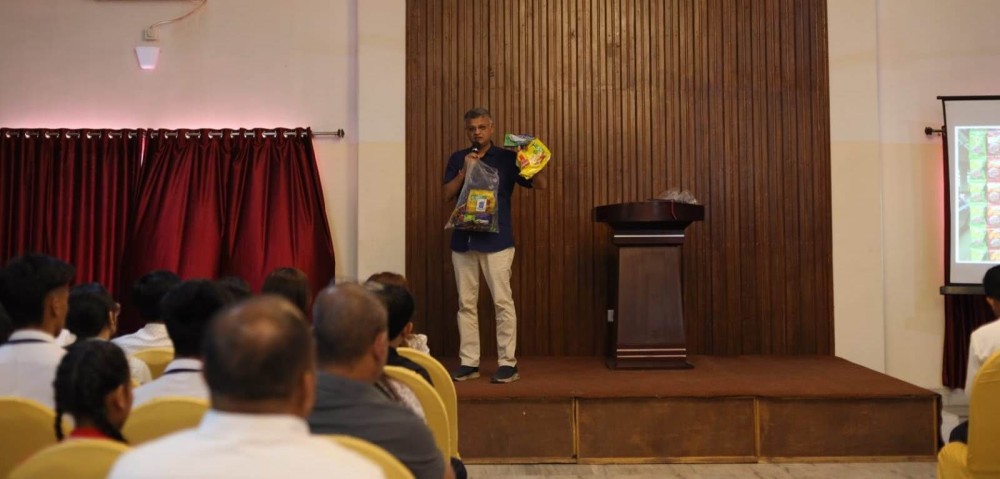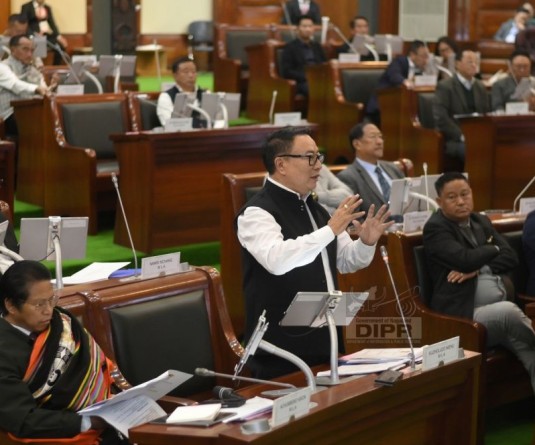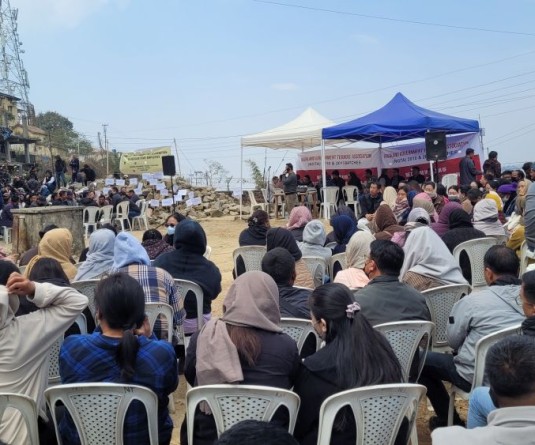Founder of Mumbai Sustainability Centre, Rishi Aggarwal displaying the Multi-Layered Plastics (MLPs) during a sensitisation workshop held in Hotel Acacia on October 13. (Photo Courtesy: Team Better Dimapur)

Morung Express News
Dimapur | October 13
‘For how long will we go on cleaning up somebody’s garbage?’ This question was prodded by Thangi Mannen, Founder of Earth Alliance during a sensitisation workshop on management of multi-layered plastics (MLPs) and single-use plastics (SUPs) which was held here, today at Hotel Acacia.
“We clean today, somebody else will dirty it. This is being faced by Dimapur and we all know it,” Mannen said, while remarking that it was not sustainable in the long run and that “we are all involved in the painful thing that we are facing.”
.webp)
In every aspect of our lives, plastic is creating a problem. Providing statistics on the waste that is being generated per day in Nagaland, she said that plastic waste, especially the Multi-Layered Plastics (MLPs) and Single-Use Plastics (SUPs) which are non-recyclable, non-biodegradable and no-reusable are wreaking havoc to the environment, one’s food habits and further creating a global issue.
Prompting the students present at the workshop to be aware of the present scenario, globally and locally, such as global warming, climate change and pollution in all fronts, she urged them to have the determination to take action. “In what little way that you can, every single small step that you all take will benefit you, the environment and the future.”
The recent flood in the city was caused due to the garbage (MLPs and SUPs) which have being thrown into the nullah blocking the water passage and eventually causing floods in towns and cities, she maintained. The flood in turn was affecting our health with the rise of dengue, due to mosquitoes breeding in the water-clogged areas.
.webp)
Mannen said that we are using multi-layered plastics everyday by consuming chips, noodles, chocolates, biscuits etc which after eating it are unmindfully thrown or put in a bin, which is being collected by the respective municipal councils and ends up in the municipality dumpsites, which are getting bigger every day. To this end, she said that small steps such as picking up wrappers and collecting it from the school and at home and depositing it to a Safai Bank will lessen the load of the DMC and in turn create a ripple effect in sensitising the entire community. She informed that the best performing school in Nagaland will be recognised in the later days.
.webp)
A total of 21 schools from Dimapur participated in the sensitisation workshop, which was organised in collaboration with Earth Alliance, DoSE, Mumbai Sustainability Centre, the Urban Development, Dimapur Municipal Council, Team Better Dimapur, Kohima Municipal Council and Mokokchung Municipal Council. Earlier, the trainings were also held in Kohima and Mokokchung on October 9 and 11 respectively, with Dimapur as its last leg.
With a commitment for a better, cleaner and healthier environment, the process would involve collection of unsoiled/clean MLPs and SUPs from the schools, colleges and homes, where the DMC and Team Better Dimapur will collect and take the waste to the Dalmia Cement Plant in Assam, where it will be burned.
Speaking on the Safai Bank of India, Founder of Mumbai Sustainability Centre, Rishi Aggarwal called upon schools and colleges to open a Safai Bank by registering it on their official website, then collect the waste and handover it over to the collection vehicle during monthly pickup. While this might be a small step, Aggarwal said that it is creating a huge impact over the country, as he delved on how other pockets of India are collectively fighting the menace of plastic waste.
As a person dealing with the responsibility of waste management, Manpai W Phom, Administrator of Dimapur Municipal Council, remarked that the problem has become enormous and alarming. We have reached a point where it cannot be solved by the municipality alone, he said.
He encouraged the young students to take action today, before it is too late to act upon it “for your tomorrow.” Calling upon the five designated schools in particular, he said that they have an added task to accomplish for the community and the township, apart from their academics and other responsibilities.
On the waste collecting system, the DMC is in the process of piloting certain wards where rounds of meetings have been held. It also plans to hold mass awareness meetings and by the end of October, they hope to see changes in the piloted wards – Duncan and Riverbelt colonies, so that they can replicate it and take it forward to other wards. While maintaining that there are loopholes to be rectified, Phom maintained that awareness on plastic waste and people’s participation on an individual and household level is fundamental in achieving success.
The DMC will also be partnering with private firms to tackle legacy waste’ through biomining. “It is in the pipeline and a huge task for the municipality as of now.” With the DMC moving towards ‘zero waste policy,’ the Administrator said that today’s programme on MLPs and SUPs is a crucial part towards this step.
The DMC will also be focusing on one part of waste at present ie, wet waste. While admitting that segregation of wet and dry waste collection has never been successful, he expressed hope that with cooperation from each individual, it would be possible.
For the wet waste, smaller vehicles will be specially designated for its collection, where it will reject any wet waste if a single plastic is found. This time, it will make a difference, he said while adding that if they are able to deal with the wet waste, 50% of our waste generation will be taken care of.
As more consciousness and awareness comes in with the people, the DMC plans on having a small composting unit at the colony or ward level, where the locality can do the compositing at the household level, for segregation of wastes.
Stressing that every individual have to be responsible for one’s own waste, the organisers called for more support in informing and educating one another from all sections of the society.






